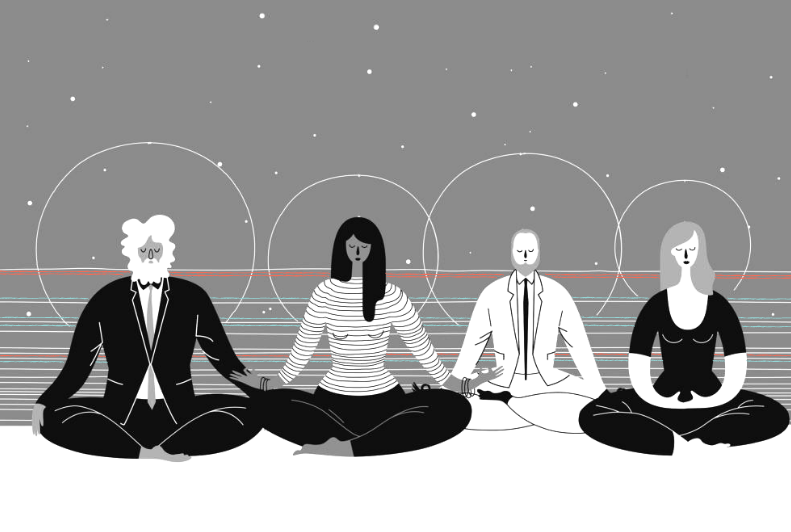Minding Your Mental Health
Practicing Mindfulness and Self-Care in the New Year
By: Madeline Driban, JFS Development & Communications
Mindfulness has always been part of the Jewish High Holidays. It is not something extra that we add on to the traditional prayer services and fasting rituals; the meditation and movement of mindfulness – the practices of listening, paying attention, waking up to the present moment – are exactly what these Days of Awe call us to do. Our holy days remind us, with great intensity, that it is up to us to choose how we live. Are we living as our best selves? Are we living what we love, what we value most?
Rosh Hashanah and Yom Kippur (and the days surrounding these holy days) are a time for reflection, a time to evaluate past mistakes, ask for forgiveness, and set intentions for moving forward into a new year. Mindfulness teaches us to forgive ourselves and others with a reminder that we are all doing the best we can in each moment – if we could have done better, we would have. We all fall short sometimes but, rather than beating ourselves up, acknowledging our own and each other’s vulnerabilities and mistakes with compassion will lead us toward possibility and growth. In this life, we all get lost at times – we all will go astray or lead others astray – but, when we notice this and ask for guidance, we take steps toward finding or returning to our best selves. This practice of awareness and reflection is mindfulness at its core.
We like mindfulness because we regain control in our lives when things start to feel chaotic and overwhelming; we are encouraged through mindfulness to engage in a lifestyle we’ve lived and know from childhood. As children, we were completely immersed in the present moment – not only did each day consist of distinct adventures, but months felt like years and years felt like lifetimes. As adults, we have responsibilities and obligations that distract us from enjoying the present like we used to; even more, we resist being labeled “present-oriented” because it is reminiscent of our childlike tendencies… and we’re supposed to act like adults now, right? As a result, time flies by without so much a second thought. We’re always thinking about what’s around the corner (or the next ten corners) instead of enjoying the wonders under our noses.
Mindfulness allows us to feel less guilty. We can indulge in activities and behaviors we enjoy, instead of feeling obligated to reduce how often we partake in them, rush them in fear of wasting too much time, or just abandoning them altogether. Mindfulness allows us to reclaim a piece of ourselves that today’s “hurry sickness” has stolen from us – our peace, our creativity, and our relaxation can all be restored. Mindfulness allows us to reform and reclaim our identities…just as we reclaim and renew our Jewish identities in our High Holiday reflections and prayers.

In recent years, mindfulness has become something of a mainstream buzzword, but the clinical benefits of mindfulness are becoming more well-known: reduced anxiety and stress, more experiences of pleasure and joy, contentment with the present moment (rather than anxiousness about the future), improved attentional capacities and memory, more effective emotion-regulation, and greater compassion towards oneself and others. Mindfulness practices are more diverse and accessible than ever. We can find new forms of mindfulness emerging everywhere we turn, whether it’s visiting a yoga studio, enjoying the sounds and smells and sights of nature, meditating or praying in a religious setting, or exploring more specific techniques in therapy; mindfulness practices can be tailored to fit your needs, whatever they may be. The secret is finding the method that works for you. This can be tricky but, just as it’s okay to admit to mistakes and vulnerability, it’s more than acceptable to seek help getting started in your mindfulness practice.
As this Jewish New Year begins and we reach out to make amends and resolutions, don’t forget to prioritize and apologize to yourself. Don’t be afraid to spend some quality time reflecting and getting to know yourself – in your own home, out in nature, or in a therapy office. (All of these have been successful for me in different ways.) Find and do those things that make you feel better, that make you feel like the person you’d like to be…that make you feel like you. Appreciate every moment of each day – good, bad, and in between; the present matters. You matter. Reclaim your identity.
As the High Holidays come and go, and the leaves start to change, give mindfulness a try. Enjoy time in nature – look at a nearby tree and try to see how many different colors or shades you see within the leaves. As you notice the beauty that surrounds you, reflect also on the beauty within yourself.
JFS is here to help you. JFS’ team of licensed professionals includes therapists who specialize in mindfulness techniques. Contact our intake department for a FREE confidential consultation. 302-478-9411 x306 or complete our online intake form to get started.

